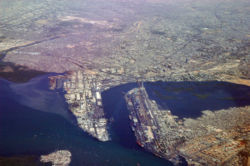Karachi
| Karachi | |
|---|---|

| |
| Presidency: Bombay | |
| Coordinates: | |
| Altitude: | Sea Level |
| Present Day Details | |
| Place Name: | Karachi |
| State/Province: | Sindh |
| Country: | Pakistan |
| Transport links | |
| FibiWiki Maps | |
|---|---|
| See our interactive map of this location showing places of interest during the British period | |
| Karachi |
During the British period Karachi was the headquarters of Karachi District and the capital of the Sind division of Bombay Presidency from 1840s until 1936 and as an independent province from 1936 till Partition in 1947.
Spelling variants
Modern name: Karachi
Variants: Kurrachee
History
It was occupied by the British in 1839.
- Wikipedia article: History
Places of Worship
Churches
Various denominations existed including Catholic, Anglican and Methodist. The oldest church was St. Patrick's Church (now Cathedral)(1840s) in the Saddar area of the city.
Catholic
Was part of the Vicariate Apostolic of Bombay until 1886. From 1886 to 1947, it was part of the Archdiocese of Bombay.
- Our Lady of Fatima
- Sacred Heart Church, Keamari
- St. Anthony's Church (1935), Cantonment
- St. Anthony's Church, Manora
- St. Christopher's Church, Airport
- St. Lawrence's Church, Soldier Bazar
- St. Patrick's Church (now Cathedral) (1843). Founder: Rev. Casabloch. Note: Started in the premises of St. Joseph's Convent. Present building completed in 1878
Protestant
- Brooks Memorial Methodist Church (1875). Founder: Rev. Frank Ambrose Goodman. Denomination: Methodist
- Holy Trinity Church (now Cathedral). Denomination: Anglican
- St. Andrew's Church (Scotch Church) (1867-68). Denomination: Presbyterian
- St. Paul's Church, Manora
Photographs of Churches in Kurrachee (taken in the 1850s- 1870s) skyscrapercity.com
Other places
- Parsi Dar-e-Meher
- Magain Shalome Synagogue (1890s) (demolished in 1980s)
- Various Hindu temples. List
Cemeteries
Military
- "Special Sanitary and Topographical Report on Kurrachee" by Surgeon-Major Dr Inglis 64th Regiment, page 349 Army Medical Department: Statistical Sanitary and Medical Reports for the year 1861 (published 1863) Google Books
Clubs and Associations
- see here
Buildings
Cinemas
- Star Cinema (1918)
Halls
- Frere Hall (1865) (Victoria Road)
- Max Denso Hall (Bandar Road)
Hotels
- Bristol Hotel (1910) Photograph Article in Dawn
- Grand Hotel
- Hotel Midway House (KLM built)
- Palace Hotel (now Sheraton Hotel)
Houses
- Mohatta Palace (1920s)
Museums
- Victoria Museum
Monuments
- Merewether Clock Tower (now known simply as Tower) Architecture: Merewether Tower, Karachi
Markets
- see here
Education
- Bai Virbaiji Soparivala (B.V.S.) Parsi High School (only for Parsis until 1947) Alumni website
- Karachi Grammer School (1847)
- Sind Arts College (later DJ College)
- St. Joseph's Convent (1862)History of SJC (official website)
- St. Patrick's High School (1861) official website
- Nadirshah Edulji Dinshaw (NED) College (formerly Prince of Wales Engineering College.) (1922, renamed 1924) official website
Newspapers
- Sind Gazette
Health
Hospitals
- Civil Hospital (1854). Located on Mission Road.
- Lady Dufferin Hospital (1898)
- Spencer Eye Hospital (1938)
Dispensaries
- Eduljee Dinshaw Dispensary (1881-1882)
- Jaffer Fudoo Dispensary
Veterinary Hospitals
- Richmond Crawford Veterinary Hospital
Institutes
- Louise Lawrence Institute (training of midwives) (after 1912)
Gardens
- Burns Garden
- Erskine Garden
- Government Garden/ Company Bagh (1885)/ Rani Bagh/ Gandhi Garden (1933) (now the city zoo)[1]
- Municipal Garden
Government Offices
- Mercantile Marine Department (May 1930)
- Sind Fisheries Department
Economy and business
Locations
This is a list of the major areas, quarters and roads of the city.
Lines
- Civil Lines
- Jacob Lines
- Jutland Lines
- N.I. Lines
- R.A. Lines
Quarters
- Artillery Maidan Quarter
- Frere Quarter
- Jamsheed Quarter
- Napier Quarter
Roads
- Britto Road
- Brunton Road
- Bunder Road (now M.A. Jinnah Road)
- Frere Street
- Jail Road
- Kutchery Road (Law courts)
- Lawrence Road (now Nishtar Road)
- McLeod Road (now II Chundrigar Road)
- Merewether Road
- Mission Road
- Napier Road
- Newnham Road
- Outram Road
- Queen's Road (now M.T. Khan Road)
- Rampart Road
- Scandal Point Road
- Somerset Road
- Victoria Road (now Abdullah Haroon Road)
For more information, visit List of streets of Karachi
Transportation
Railways
There were two stations, McLeod Road Station (now City Station) and Frere Street Station (now Karachi Cantt)
Tramway
- The Karachi Tramway of Yesteryears 14 September 2007 All Things Pakistan, now an archived website.
Karachi Harbour
Karachi Port Trust was established by an Act in 1886 (effective 1887) to manage the affairs of the port.
- Kemari (earlier an island, but joined to the mainland)
- Mules MansionThe Karachi Walla
- Napier Mole
References
- ↑ Soomro, Durdana, "Pleasure Gardens of a Raj City". Lahore: Sang-e-Meel. 2007 pg 43
External Links
Karachi Love to Know 1911
Karachi City Imperial Gazetteer
Maps
Kurrachee Harbour Map 1882 from the Historical Maps of Asia Collection, University of Texas, Austin
Booklets
- Guide to Karachi Booklet produced for US Soldiers during WWII
- Special Service Booklet for US Soldiers during WWII
Thesis
- Haider, Azimusshan (1971), History of Karachi with special reference to educational and commercial development (1839-1900), PhD thesis, University of Karachi, Karachi.
- Wajidi, Muhammad Abuzar (1990) KMC (Karachi Municipal Corporation): A study of its administrative and financial organisation PhD thesis, University of Karachi, Karachi.
Other
- "Sugar and Stone" by Peerzada Salmon Dawn Sunday 3 April 2011. Select page 16 under Karachi. Article about historical buildings, with photographs
- Somake`s Karachi by Peerzada Salman Dawn 23 May 2011. Moses Somake, born 1875, was an architect in Karachi
Video
- Christian Cemetery, Karachi BBC Urdu report (in Urdu)
- A Very Rare Old Karachi Video 1942 by a British Soldier You Tube
- Churches of Karachi Short documentary on their construction/architecture (in Urdu) on youtube
Further Reading
- Lari, Yasmin and Mihail Lari, "The Dual City: Karachi during the Raj" Karachi OUP. 1997. ISBN: 978-0195777352